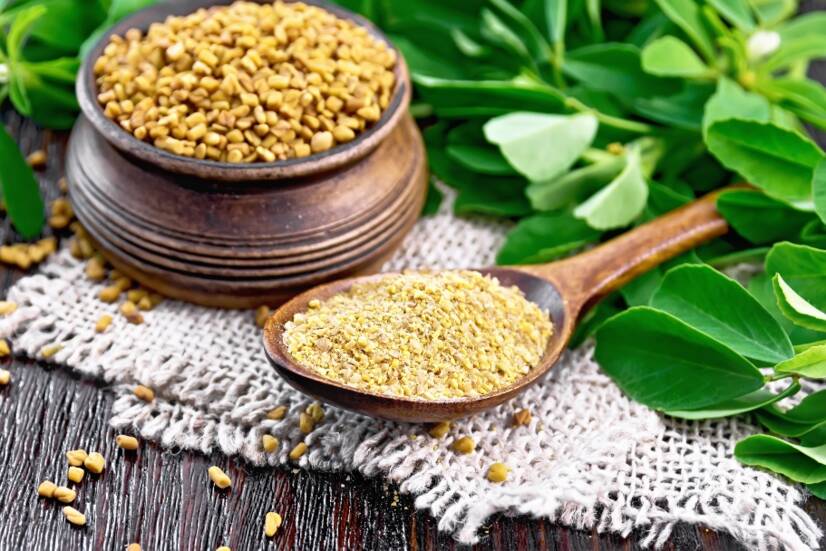- TREBEN, Maria: "A preparation for children and young people that is found in the body. Health from God's Pharmacy: medicinal herbs, advice and experience. 5th edition published in the Czech Republic. Translated by Jana DUŠKOVÁ. České Budějovice: Dona, 2022. ISBN 978-80-7322-236.
- TREBEN, Marie: Medicinal plants and medicinal preparations. Herbs in prevention and treatment. Translated by Ivana KRAUSOVÁ. Olomouc: Fontána, [2021]. ISBN 978-80-7651-065-4
- healthline.com - Fenugreek: an herb with impressive health benefits. Healthline. Rudy Mawer, MSc, CISSN
- medicalnewstoday.com - Is fenugreek good for you? Medical News Today. Zara Risoldi Cochrane, Pharm.D., M.S., FASCP - How to take it?
fenugreek: what are its effects on health, libido?

Fenugreek is a worldwide herb native to Asia. It is used primarily for its effects on the male and female reproductive systems, digestive and respiratory systems. What are all the effects of fenugreek on human health? Does it promote libido and performance?
Characteristics
Fenugreek has been used in traditional Eastern medicine for centuries. Its most famous effect is to promote sexual vitality.
Today, it forms the content of many dietary supplements.
In the article you can read about the content and composition, health effects, contraindications, dosage, home cultivation and much more interesting information.
What is fenugreek?
Fenugreek is professionally called Trigonella foenum graecum.
It is originally a plant from Asia, but it is also widespread in the Mediterranean. The first references to fenugreek come mainly from Asia, India and ancient Egypt.
The fenugreek grows to a height of 60-90 cm. It is characterised by its round leaves. Its fruit is a pod which, when ripe, contains bean-shaped seeds. In Ayurvedic medicine, fenugreek is considered one of the oldest medicinal herbs.
Our ancestors often used it as a natural aphrodisiac for both men and women.
Fenugreek is interesting for its beneficial effects on the reproductive system of both sexes. It also supports the digestive and cardiovascular systems and has anti-inflammatory properties, especially for respiratory diseases.
Today, fenugreek can be found in the form of various dietary supplements, both on its own and in complex products.
Different forms of fenugreek processing:
- Dried fruits of the plant
- Tea blend
- Ground powder
- Extract in capsule/tablet form
- Tincture, drops
- Oils
Contents and composition of Fenugreek
The health benefits of fenugreek are due to its composition in terms of macro- and micronutrient content and natural active ingredients.
Fenugreek contains mainly flavonoids, phytoestrols and saponins. It is characterised by its high content of proteins and essential amino acids. It contains fibre, resins, tannins and essential oils.
It contains large quantities of minerals such as zinc, iron, magnesium, potassium and manganese. Of the vitamins, vitamins B3, B6 and C are particularly noteworthy.
Diosgenin is one of the most important substances contained in fenugreek. It is a phytosterol that ensures optimal levels of sex hormones in both men and women.
It helps in the physiological production of breast milk.
Flavonoids are known substances with antiviral, anti-inflammatory and antioxidant effects. Saponins help to reduce bad cholesterol levels, have a beneficial effect on immunity, vitality and the cardiovascular system.
Internal use
Increase libido and sexual vitality
An effect that applies to both sexes equally is just an increase in libido and sexual desire. Fenugreek acts as a natural aphrodisiac and life enhancer.
The active substances in the herb help with the overall blood circulation of the body and therefore with the blood circulation of the pelvic area and sexual organs. It also has a beneficial effect on fertility itself.
Fenugreek is a common ingredient in nutritional complexes for men, precisely to promote blood circulation, improve sexual performance and erection quality.
Lactation support in women
For women, fenugreek is especially known as a natural remedy for increasing breast milk production. New mothers who have a problem with breast milk production can reach for fenugreek tea.
However, a consultation with a gynaecologist is always necessary.
Another effect is to promote breast growth. This is due to the higher concentration of diosgenin in the plant, which stimulates the hormone estrogen. Women who do not breastfeed but desire a firmer cleavage will also appreciate the boost in estrogen production.
It is also known to slow fat loss from the breasts.
Another interesting effect is the beneficial effect on painful heavy menstruation or on menopausal symptoms. For some gynecological diagnoses, consultation with a doctor is necessary.
Support for the digestive system
Fenugreek helps against bloating, flatulence, constipation and promotes digestion.
Many studies show that the water-soluble fiber contained in fenugreek helps to eliminate constipation and promote digestion.
Due to its anti-inflammatory effects, it is being investigated as part of the treatment for ulcerative colitis.
The herb stimulates metabolism and energy metabolism. It is used as a natural remedy to harmonize the activity of the digestive tract. It also helps in normalizing the production of stomach acid and does not irritate the body.
Supports the cardiovascular system
Fenugreek supports the overall health of the cardiovascular system. It naturally combats coronary heart disease, reduces high blood fats, unwanted LDL cholesterol and triglycerides.
Helps blood circulation throughout the body, including its peripheral parts.
It also balances high blood sugar levels.
Helps in respiratory diseases
Fenugreek also helps with sore, swollen and inflamed throats or tonsillitis. It is effective for sore throats, facilitates expectoration and is also used as part of gargling. The effect is possible due to the herb's anti-inflammatory and antibacterial properties.
External use
Help with healing and inflammation
When used externally, fenugreek is an effective remedy for inflammation, ulcers or swelling. It was used as part of a complex of herbs that served as poultices or wound rinses.
Externally, it can be used as a poultice for eczema, wounds, ulcers, rashes and other skin or inflammatory problems.
Summary of the beneficial effects of fenugreek:
- Promoting overall health and vitality
- Anti-inflammatory effect
- Support of the cardiovascular system
- Reduction of bad cholesterol levels
- Supporting the digestive system
- Elimination of bloating and constipation
- Overall blood circulation
- Support libido and sexuality
- Aphrodisiac effect
- Support physical performance
- Support lactation and milk production in women
- Elimination of PMS and menopausal symptoms
- Support erection quality in men
- Support healing of skin problems

Harvesting and storage
Home growing fenugreek Greek hay
Growing fenugreek is possible even in mild climates. However, a few principles must be observed.
In particular, heat and humidity are important, so that the climatic conditions resemble those of the Mediterranean as closely as possible.
Good quality seeds are important to start with, so the only criterion for selection should definitely not be low price. Sow the seeds directly in the field in the spring in rows.
A place with sunlight, nutrient-rich soil and plenty of moisture is best.
For proper growth it needs a place with plenty of sun, loamy sandy soil and nitrogen fertiliser.
Watering should be regular.
The soil should be fertilised occasionally with nitrogen fertiliser.
Mature seeds should be collected in July to August. It is recommended to collect seeds from mature pods before they burst. The seeds can then be left in the sun to dry out completely. Both the seeds and the leaves of the plant can be used.
Who should be vigilant when taking fenugreek?
As long as you are healthy and follow the prescribed dosage, you should not experience any adverse and side effects when taking fenugreek. Despite the beneficial effects of this herb, some individuals should be wary.
In rare cases, indigestion with diarrhea, headaches, and low blood sugar are possible.
If a certain allergic reaction occurs while taking fenugreek, stop taking the herb immediately and consult your allergist.
Fenugreek should not be taken by those who have severe bleeding disorders or are taking blood thinning medications.
If you have diabetes or low blood sugar, you should be cautious when taking fenugreek. If you have problems with excessive urination, be vigilant. The plant promotes sweating and excretion of fluids from the body.
Women should always be cautious when taking fenugreek during pregnancy and consult a gynecologist because fenugreek stimulates sex hormones.
The herb can promote uterine muscle contractions that can induce premature labor. Therefore, it is not suitable for pregnant women.
When breastfeeding, it is advisable to consult a specialist for dosage. Fenugreek is not suitable for children because of its hormone-stimulating effect.
Dietary supplements and dosage
The current market offers a variety of dietary supplements containing fenugreek. In most cases, they are intended for internal use in the form of capsules, dried tea mixtures and tinctures. The choice should not be based solely on price, but primarily on the content and composition of the supplement.
The basic form of fenugreek is tea, which can be purchased in loose and sachet versions. It is used to promote general health, aid digestion and support hormonal balance.
Very often, tea with a double combination of fenugreek with the herb Benedictine is sold to increase milk production in women.
Fenugreek is also used to flavour dishes as a spice in the form of ground powder. However, it is not used as a stand-alone spice because of its pungent aroma. It is found in various spice blends, such as the well-known curry spice.
The well-known oral form of use is the extract in capsules or tablets. It is possible to buy preparations containing fenugreek only or, conversely, as part of a nutritional complex.
To support the libido and sexual performance of a man, it is advisable to reach rather for a complex of several herbs.
If you take fenugreek in the form of a ready-made dietary supplement, follow the dosage and recommendations directly from the specific manufacturer of the product.
There is no official daily dose. It is therefore essential to adhere to the maximum daily dose of the dietary supplement.
Interesting resources
Related










